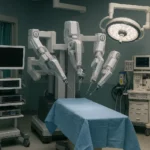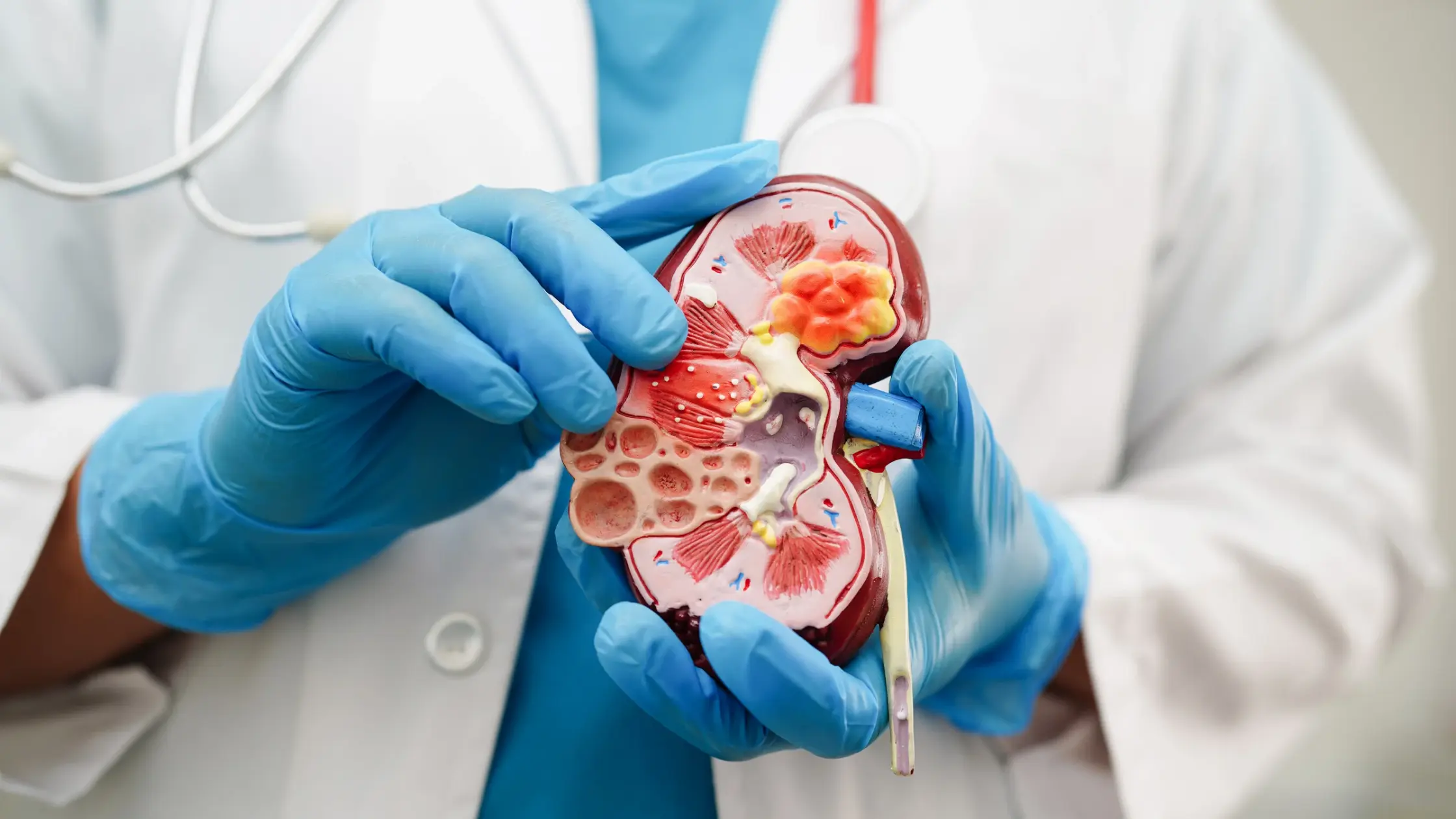Kidney Disease Treatment with Stem Cell Therapy in India
Chronic kidney disease has reached a scale expanse of concerns affecting millions with patients needing dialysis, a life-sustaining but strenuous approach. Regenerative medicine, especially stem cell therapies, shines a ray of hope. Can this novel strategy find a way to reverse kidney damage? Thereby reducing or eliminating the need for dialysis in the patient. Consequently, here we shall examine the present treatment options for kidney diseases and prospectively assess the role of stem cell therapy in improving patient outcomes.
Understanding Kidney Disease and the Role of Stem Cell Therapy
Chronic kidney disease (CKD) means a slow loss of kidney function. The kidneys perform a crucial filtering work, where they remove waste and excess fluid from the blood; when the kidneys start failing, waste accumulation occurs, bringing with it multiple complications.
The major causes are:
Diabetes- elevated blood sugar will damage kidney filters;
Hypertension- raised blood pressure is the excessive force on kidney vessels;
Glomerulonephritis- inflammation of the filtering apparatus of the kidney;
Polycystic Kidney Disease- genetic disorder of cyst formation in kidneys.
Management will seek to treat symptoms and slow progression, and when matters get worse, either dialysis or transplantation of the kidney will be needed.
Dialysis: A Lifesaving Yet Challenging Path
When kidneys fail, blood is filtered from the body through a process called dialysis. There are two main types of dialysis:
Hemodialysis: Blood is filtered out using an external machine.
Peritoneal Dialysis: The lining of the abdomen performs that function in the body.
Dialysis is lifesaving, but it has some downsides:
Time Consuming: Several sessions a week, each lasting several hours.
Physical Strain: It also produces fatigue, infections and other complications.
Life-oriented: Limits work, travel and daily activities.
Financial Burden: Generally demands high costs over time.
Because of the above challenges, there are so many alternative therapies.
What is Stem Cell Therapy?
Stem cells are cells that can specialise into many different types in the body. Moreover, they serve as a repair system replenishing damaged tissues. In addition, there are several types:
Embryonic Stem Cells: Pluripotent cells taken from early embryos.
Adult Stem Cells: Reside in different tissues; multiples; gives rise to a limited range of cells.
Induced Pluripotent Stem Cells: Adult cells reprogrammed into an embryonic-like state.
The use of stem cells for regenerative medicine is to repair or replace damaged tissues and organs.
How Stem Cell Therapy Can Transform Kidney Disease Management
Studies related to stem cell therapy for kidney disease continue. Some of the expected benefits are the following:
Regeneration of Kidney Tissue: Stem cells may be able to differentiate into renal cells to help in repair.
Reduction of Inflammation: They can modulate immune responses and so decrease inflammation.
Slowing of Disease Progression: The promotion of damage repair with reduced damage may delay progression into end-stage renal disease, thereby improving long-term outcomes.
So far, studies seem to give good outputs in animal models, but applications in humans are still being researched.
Can Stem Cells Really Prevent Dialysis?
The potential of stem cell therapy to prevent or delay dialysis is an area of active research. Factors influencing outcomes include:
- Stage of CKD: Early intervention may yield better results.
- Type of Stem Cells Used: Different sources may have varying efficacies.
- Delivery Methods: Intravenous injection vs. direct kidney injection.
- Patient’s Overall Health: Comorbidities can affect treatment success.
While initial findings are encouraging, large-scale clinical trials are necessary to establish efficacy and safety.
Ethical and Regulatory Considerations
Stem cell therapy comes with a volley of ethical and regulatory issues:
- Source of Stem Cells: Ethical debates arise surrounding the utilization of embryonic stem cells.
- Regulatory Approvals: These differ greatly depending on which country one is applying for permission; some therapies might not even have been approved or standardised.
- Safety Issues: There are concerns with possible tumor formation and immune reactions.
Patients should consult with their health care providers and consider joining approved clinical trials.
The Future of Kidney Disease Treatment
Because of advancements in regenerative medicine, CKD patients can have hope for the future. Directions for future developments include:
- Personalized Medicine: Tailoring treatments based on the individual genetic profile.
- Combining Therapies: Stem cells used with gene editing or nanotechnology.
- Bioengineering: Developing lab-grown kidney tissues or organs.
All these innovations target improved outcomes and lesser dependence on dialysis.
What Should Patients Know Today?
Currently, stem cell therapy for kidney disease is experimental. Patients should:
- Exercise Caution: Be wary of unproven treatments offered outside clinical trials.
- Stay Informed: Follow reputable sources for updates on research progress.
- Consult Specialists: Discuss potential options with nephrologists or kidney specialists.
Why Choose Regimen Healthcare for Kidney Disease Treatment in India?
- Personalized Support: From the moment you reach out, Regimen Healthcare offers one-on-one assistance, guiding you through doctor selection, hospital coordination, and visa processes. Additionally, we ensure a smooth and efficient journey at every step.
- Trusted Network: We are partnered with top kidney hospitals in India, ensuring access to highly qualified kidney specialists and advanced nephrology care. As a result, patients receive the best possible treatment and expertise for their kidney health.
- Affordable Medical Packages: Transparent pricing with cost-effective treatment plans, including kidney transplant, dialysis treatment, and stem cell therapy in India.
- Language Assistance: Multilingual support to help international patients communicate easily throughout the treatment journey. Moreover, we ensure that language is never a barrier, providing clear and effective communication at every step.
- Complete Care Journey: From pre-travel medical opinions to post-treatment recovery support and airport pickup, we ensure a smooth and worry-free experience. Furthermore, we provide seamless assistance at every stage, ensuring comfort and convenience.
Why India for Kidney Disease Treatment?
- Globally Accredited Hospitals: India is home to the best kidney hospitals, many of which are NABH and JCI accredited.
- Renowned Kidney Specialists: Highly experienced nephrology doctors and transplant surgeons lead kidney treatments and surgeries.
- Cost-Effective Care: Kidney transplant cost in India is significantly lower than in Western countries without compromising quality.
- Advanced Infrastructure: Modern facilities, high-end dialysis units, and cutting-edge stem cell therapy centers are available across major cities like Delhi, Mumbai, Chennai, and Bangalore. Furthermore, these centers offer top-notch care with the latest technologies and treatments.
- Shorter Waiting Times: Unlike in many countries, India offers fast-track appointments and minimal delays in scheduling kidney surgery or treatment.
Conclusion
Stem cell therapy holds promise for revolutionizing kidney disease treatment, potentially reducing or eliminating the need for dialysis. However, it remains in the experimental stage and more research is needed to confirm its efficacy and safety. Patients should remain hopeful but cautious, relying on established treatments and consulting with healthcare professionals for the best care options.
Are you or a loved one seeking world-class kidney treatment, dialysis support, or stem cell therapy in India?
If so, Connect with Regimen Healthcare today for a free medical opinion, customised treatment plan and full assistance throughout your healing journey.
📞 Contact Us Now: +91-9310356465
🌐 Visit: www.regimenhealthcare.com
Frequently Asked Questions (FAQs)
1. Can stem cell therapy cure kidney failure completely?
Stem cell therapy is not yet a confirmed cure, but it shows promise in slowing kidney damage and potentially delaying the need for dialysis.
2. What is the cost of kidney transplant in India?
The average cost ranges between $11,500 to $16,000; however, it depends on the hospital and patient condition. Moreover, Regimen Healthcare helps you find the best package.
3. Is stem cell therapy for kidney disease available in India?
Yes, stem cell therapy in India is available at selected research-backed centers and hospitals. In fact, it is offered under clinical or compassionate use.
4. How long does a kidney transplant take in India?
The entire process—from evaluation to transplant—may take around 2 to 3 weeks, especially with Regimen Healthcare assisting in fast-tracking logistics.
5. Who are the best nephrology doctors in India?
India has many renowned nephrologists, including Dr. Sunil Prakash, Dr. Dinesh Khullar, and more. We connect you with the best based on your case.
6. Which is the best kidney hospital in India?
Hospitals like Max Healthcare, BLK-Max, Apollo, and Madhuban Kidney Care are among the top kidney hospitals in India. Additionally, these hospitals offer world-class nephrology care and expertise.
7. Can dialysis be avoided with stem cell therapy?
In early stages of kidney disease, stem cell therapy might help delay progression and reduce dependency on dialysis, but it’s still under research.
8. What is the cost of dialysis treatment in India?
Each dialysis session costs around 50-80 USD, depending on the hospital. Monthly packages are also available.
9. Is India safe for international medical travelers?
Yes, India is one of the top destinations for medical tourism. Moreover, it offers well-regulated hospitals, safe infrastructure, and global-standard care.
10. How can I start my kidney disease treatment process with Regimen Healthcare?
Simply contact our team via WhatsApp, email, or phone. Then, share your reports, and we will provide you with opinions from top kidney specialists and help plan your treatment journey.








